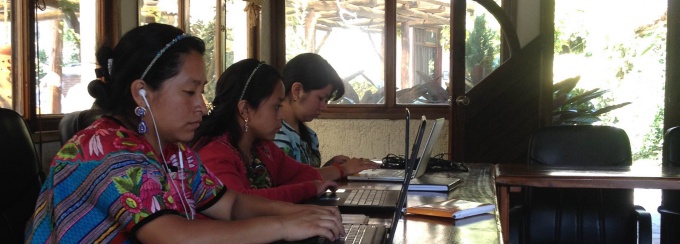Field Research

Field research in Latin America
Linguistic Fieldwork research involves the study of lesser-studied languages in loco, in direct interaction with native speakers, with a goal of developing detailed descriptions of these languages and/or formulating and testing linguistic hypotheses. The documentation, description, and analysis of understudied languages can sometimes leading to community-oriented applications of linguistic research, such as language revitalization. The Department of Linguistics has a very strong component of field research, spanning a wide range of specialties.
Core Researchers
Jürgen Bohnemeyer, PhD has been conducting field research on Yukatek Maya in Mexico since 1991, totaling more than two years spent in the field. His research focuses on problems of semantics, pragmatics, the lexicon-syntax interface, and semantic typology, the study of linguistic categorization. He has been continuously involved with the development and refinement of methods for the study of these problems in the field. Bohnemeyer also carries out experimental work in the field, focusing in particular on validations of the Linguistic Relativity Hypothesis.
Christian DiCanio, PhD has done linguistic fieldwork in Mexico since 2004 and has focused on the phonetics, phonology, and morphophonology of Otomanguean languages (Triqui, Mixtec, Ixcatec). His work on these languages focuses mainly on how tone, length, and glottalization interact in speech production and their role in the phonology and morphology of these languages. His current NSF grant (Understanding Prosody and Tone Interactions through Documentation of Two Endangered Languages) involves the investigation of the prosody-tone interface in Itunyoso Triqui and Yoloxóchitl Mixtec, the development of computational tools for speech segmentation in each language, and text documentation.
Matthew Faytak, PhD has been conducting phonetics-focused fieldwork since 2014 as a major part of his research program. He has carried out fieldwork in China and Cameroon on a variety of languages in several families (Mandarin, Wu, Grassfields Bantu, Yemne-Kimbi), focusing on collection of ultrasound and acoustic data. His current NSF grant expands his focus to nasal and oral airflow data from speakers of twelve Amazonian languages, collected by collaborating field linguists.
Gladys Camacho Rios, PhD got immersed in language documentation in 2018. She is a community-based language researcher. She documents and describes the way elders across the Andes speak South Bolivian Quechua (SBQ). Her work focuses on SBQ verbal morphology, as well as morphological contact between Quechua and Aymara. She also produces community-oriented written materials in SBQ. In 2019 she published a story book ¡Kumpa Atuqmariqa! ‘The Adventures of Mister Fox’, in 2022 she published a comic book. This last one shows public awareness on the cultural heritage that is still alive in the oral knowledge of elderly people who speak SBQ monolingually. Her goal is to preserve and revitalize her native language by writing books for children and teenagers inspired by folk tales from the Quechuan Culture.
Jeff Good, PhD has been conducting field research in Northwest Cameroon since 2004 as part of more general research on Benue-Congo languages. His particular focus has been on languages of the Beboid family, close relatives of Bantu languages with quite distinct surface typology from them. In addition to a descriptive interest in these languages, he is interested in how they can inform the study of comparative Benue-Congo morphosyntax and, thereby, the study of the relationship between syntax and morphology more generally.
Recent Field Researcher PhDs
The Department of Linguistics encourages field work by graduate students; PhD course requirements include a full year of Field Methods.
- Hiroto Uchihara (2013). Tone and accent in Oklahoma Cherokee
- Jesse Lovegren (2012). Mungbam grammar
- Michael Frank (2011). Language Maintenance and Change among the Swiss Mennonites of the Waterloo Region, Ontario
- Robert Fried (2010). A Grammar of Bao-an Tu, A Mongolic Language of Northwest China
- Carolyn O’Meara (2010) Seri Landscape Classification and Spatial Reference
- Scott Paauw (2009) The Malay Contact Varieties of Eastern Indonesia: A Typological Comparison.
- Gabriela Perez Baez (2009) Endangerment of a Transnational Language: The Case of San Lucas Quiavini Zapotec
- Rodrigo Romero Mendez (2009) A Descriptive Grammar of Ayutla Mixe (Tukyo’m Ayuujk)
- Percy Abrams (2006). Onondaga Pronominal Prefixes (Iroquoian)
- Joy Wu (2006). Verb Classification, Case Marking, and Grammatical Relations in Amis (Austronesian, Taiwan)
- Lilian Guerrero-Valenzuela (2005). The syntax-semantic interface in Yaqui complex constructions, a Role and Reference Grammar Analysis (Uto-Aztecan)
- Todd McDaniels (2005). Establishing perspective in Comanche Narrative (Uto-Aztecan)
- Ardis Eschenberg (2005). The Article System of UmoNhoN (Siouan)
- Eve Ng (2003). Demonstrative words in the Algonquian Language Passamaquoddy: A descriptive and grammaticalization analysis
- Sidi Facundes (2000). The Language of the Apurina People of Brazil
- Matthew Davidson (2002). Studies in Southern Wakashan (Nootkan) Grammar
Ongoing PhD Field Research
- Adam Hatfield: Mehek (Sepik)
- Adam Sposato: Xong (Xiangxi Miao)
- Monty Hill: Tuscarora (Iroquoian)
- Jennifer Wilson: Yeri (Torricelli)